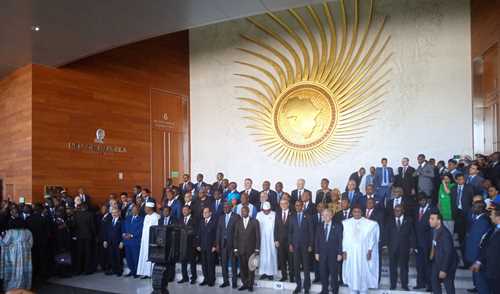African leaders emerging from the 33rd African Union summit, which started on Sunday 9 and ended late on Monday in Addis Ababa, Ethiopia, have resolved to be seized of the Libyan crisis, from which they were sidelined by international efforts to restore normalcy in the strife-torn north African country.
By Lemine Ould M. Salem, Special Correspondent, Addis Ababa
Seven years ago, during the 50th anniversary of the founding of the Pan-African organization heads of state and government of the African Union had made a vow to “silence the guns” on the continent by 2020.
Meeting on Sunday, February 9, they had plenty of time to realize that they were far from the target, even if some minor progress was made, especially in Sudan and the Central African Republic (CAR) while in Cameroon and Mozambique new conflicts have reared their ugly heads in the interim.
Throughout the summit African leaders endeavored to bring to an end, the wars tearing the continent apart.
As a token of Africa’s inability to resolve the continent’s conflicts, the case of Libya was high on the agenda of the debate at the summit of heads of state and government.
In this country, once one of the most heavily armed on the continent, western military intervention which caused the fall of Colonel Muammar Gaddafi in 2011 turned the former Jamahiriya into a vast battlefield pitting disparate militias against each other, each backed by external powers, while causing the destabilization of neighboring countries, particularly those of the Sahel.
In this region of the continent, six times the size of France, jihadist groups, most of whose armaments were drawn from the arsenal of the former Libyan leader, today pose the “risk of collapse” on the states of the region, according to Moussa Faki Mahamat, the President of the AU Commission, the executive organ of the organisation.
If African leaders’ words are anything to go by, the long silence of the Pan-African organization on the Libya issue is over.
“The war in Libya was decided against the advice of our organization. The AU has tried to find a solution that could prevent the war in Libya, but those who started this war did not heed our call. The worst of it all is that they did everything to keep us out of this problem,” a senior AU official said on Monday morning.
“After so many years of marginalization of our organization, the international community is finally realizing its mistake. And so much the better, “he said, ahead of the AU’s Commissioner for Peace and Security’s condemnation of what he called an “attitude of denial” that had lasted for far too long.
“They have been busy with the issue for more than eight years. So denying Africa its own participation is inexplicable. We raised our voices and signaled that this could put a strain on our collaboration with them,” said Algeria’s Smail Chergui, in reference to the international community embodied by the United Nations.
The UN boss, who came the day before to attend the opening of the summit, said he understood the indignation of African officials.
“I fully understand this frustration, Africa has been sidelined as far as the Libyan conflict is concerned,” he added.
As evidence of their willingness to get involved in Libya, African heads of state and government have announced several initiatives.
A national reconciliation forum bringing together the main actors of the Libyan crisis, but also representatives of different tribal, ethnic and religious communities will also be convened.
Among the countries that could host such a meeting is Algeria, which has offered to do so.
Morocco, which has already hosted the first inter-Libyan conference in Skhirat, near Rabat, is believed to be favored by a large number of AU member countries, as well as some Libyan parties.
Organized in 2015, the Skhirat meeting had resulted in the only political agreement realised so far between the Libyan belligerents, and on the basis of which the Government of National Unity (GNA) led by Prime Minister Fayez al-Sarraj was formed in Tripoli, with the backing of the international community.
A special summit on Libya is also slated for May in South Africa, whose president, Cyril Ramaphosa has been appointed by his peers as the new AU chair for the next twelve months to replace Abdel Fattah al-Sissi of Egypt.
With the United Arab Emirates and Saudi Arabia, the latter is a fervent supporter of Marshal Khalifa Haftar, the head of the self-proclaimed Libyan National Army (LNA) which is involved in an armed struggle with the GNA, and whose offensive in Tripoli which was launched in April has only worsened the already volatile situation.
Los/id/te/fss/as/APA


